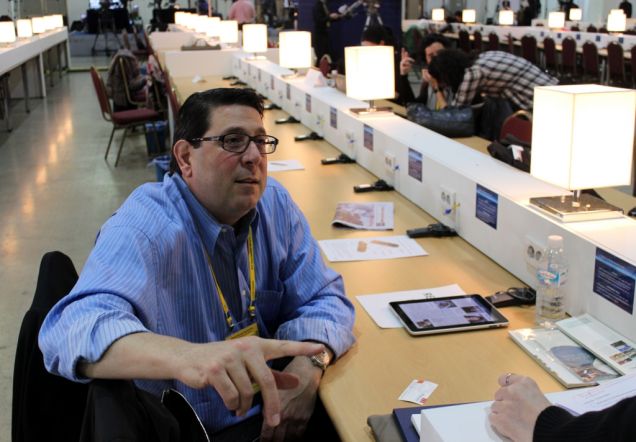
“Climate, cyber, nuclear, financial – all the transnational issues are suffering from the same problem,” says Kenneth Luongo. “You have to find a way to break out of the 20th-century nation-centric mindset to solve global challenges. The conservative answer to nuclear security is that we are nation states. The real answer is that radiation doesn’t respect borders.”
Kenneth Luongo believes in the possibility to change that mindset and he isn’t afraid to deal with the big issues. “I don’t dwell on the details for the most part,” he says. “I’m looking out over the next 20, 40, 50 years. Where do we need to be? How are we going to get there?”
Coming from the average person, all this might sound rather grand but not very realistic. Don’t underestimate Kenneth Luongo though. He’s is a down-to-earth type with a wry sense of humour – and the kind of global security track record that gives you a licence to think large. (Article continues below video)
Solving 21st Century Security Challenges: Kenneth Luongo at TEDxHagueAcademySalon
Multiple partners, multiple paths
Under the Clinton administration, Luongo was senior advisor on non-proliferation policy to the US Energy Secretary. It was a time when the collapse of communism had opened up historic opportunities, and but also brought new dangers. The Cold War had left Russia with a massive stockpile of nuclear material and facilities, while the political system for managing them had caved in along with the economy.
Kenneth Luongo pushed ahead an initiative to team up with the Russians and deal with the weapons-grade nuclear material left scattered about the country. The result was a bilateral programme to protect material using rather more sophisticated methods than the padlocks, string and sealing wax Luongo observed in one Russian nuclear storage facility.
“That initiative was unprecedented. The US government had already been trying to do it in various ways, but we actually succeeded in getting our partners in Russia to agree to allow us to work on actual nuclear weapons material – not just play in the kiddy pool. I didn’t do it alone and we didn’t just rely on government channels. It takes multiple partners and multiple paths to make real progress on complex issues where technology and politics meet.”
What’s more, you’ll see the consequences of that initiative still playing out when world leaders meet in The Hague at the Nuclear Security Summit, Luongo adds. “That cooperation with the Russians is what this summit is based on only now expanded globally. Without that precedent, none of this would have been possible.”
'I play to win'
The NSS is aimed at combating the chilling threat of nuclear terrorism. But just how terrified should we be? Are our societies more insecure than they used to be?
“The base threats haven’t changed,” Luongo argues, “but technology has created new ones and heightened the understanding, knowledge and perception of danger. Because danger sells, and we’re in a media saturated world that enhances the sense that there is danger all around us – but there are real and serious threats.”
Kenneth Luongo will be at the NSS arguing that the responsibility for tackling the challenges of nuclear security is an international one and we need to forge new forms of international cooperation. That’s quite a tall order – isn’t it an uphill struggle?
“It’s all an uphill struggle,” he agrees. “But we win. I don’t play this game just to get a cheque or to lose. I play to win. And we do win. And we have had a significant impact on the summit process.”
Summing up, what will his message be at TEDxHagueAcademySalon?
“We’re in a new world, we need to modernise the system. I’ll offer some ideas that have worked and can be applied to today’s global challenges. We need to figure out where we want to end up, and how we’re going to motivate ‘the system’ overall to move in this direction.”
